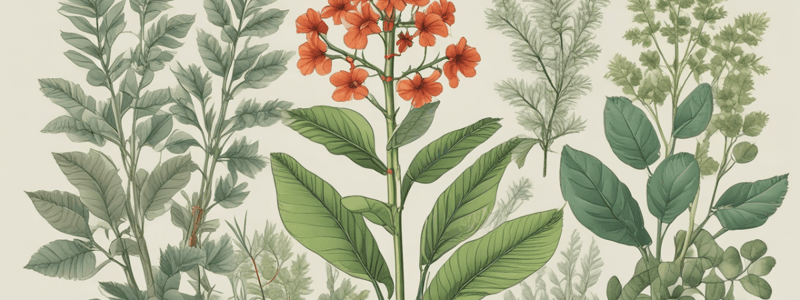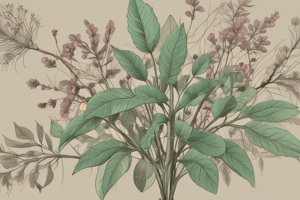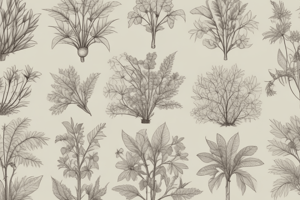Podcast
Questions and Answers
Most of the plants around us are ______ or flowering plants.
Most of the plants around us are ______ or flowering plants.
angiosperms
The ______, fruit and seeds are reproductive structures.
The ______, fruit and seeds are reproductive structures.
flower
Vegetative Structures are those parts that are responsible for the increase in ______, height and mass of the plant.
Vegetative Structures are those parts that are responsible for the increase in ______, height and mass of the plant.
size
______ propagation can be done using the stem, leaf or roots.
______ propagation can be done using the stem, leaf or roots.
MONOCOTYLEDON plants have leaves that are ______ with parallel veins.
MONOCOTYLEDON plants have leaves that are ______ with parallel veins.
DICOTYLEDON plants have leaves that are ______ with a network of veins.
DICOTYLEDON plants have leaves that are ______ with a network of veins.
Flashcards are hidden until you start studying
Study Notes
Plant Structure and Function
- Most plants around us are angiosperms or flowering plants, which produce seeds inside a fruit.
- Agriculture is heavily dependent on angiosperms, as crops are angiosperms that provide food for humans and animals.
Vegetative Structures
- Responsible for increasing plant size, height, and mass.
- Examples: leaves, stem, branches.
Reproductive Structures
- Responsible for producing new plants with parental characteristics.
- Examples: flower, fruit, seeds.
Vegetative Propagation (Asexual Reproduction)
- Under certain conditions, vegetative parts can be used for reproduction.
- Can be done using stem, leaf, or roots.
Monocotyledon and Dicotyledon
Monocotyledon Characteristics
- Narrow leaves with parallel veins.
- Examples: grass, sugarcane, rice plants.
- Fibrous root system.
- Petals normally in groups of three.
Dicotyledon Characteristics
- Wide leaves with a network of veins (except dasheen, which has wide leaves and netted veins).
- Examples: palm tree, trees, shrubs, soft-stemmed plants.
- Tap root system.
- Petals normally in groups of four or five (e.g., lily).
Studying That Suits You
Use AI to generate personalized quizzes and flashcards to suit your learning preferences.


